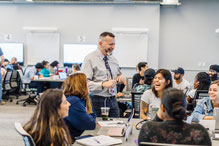The UC Merced English Program teaches students the story of how stories are made, how they make a difference in the world, and how they form the foundation of knowledge itself. Stories allow the marginalized to be heard by the powerful: they help humans understand each other’s past and present, and they help us imagine different futures.
Studies show that English majors and other humanities majors achieve substantially greater gains than business, technology, and engineering majors in writing ability, complex reasoning, and critical thinking—skills that today’s employers are actively seeking.
Our English majors take 24-person seminars throughout their time on campus. Small class sizes, supportive professors, and brilliant, kind students make our program one of the most nurturing both at UC Merced, and in the whole UC system. Our passionate and caring instructors teach courses that cover literature of all kinds, from Renaissance England to 18th century India to modern day California. In the Senior Thesis class, Honors Program, and UROC-H program, English majors work closely with faculty to conduct research, adding impressive experience to their job or graduate school applications.
Graduates of the English program have gone on to become tech entrepreneurs, lawyers, medical professionals, teachers, non-profit leaders, librarians, park rangers, and more, while others have gone on to be admitted to top literature, creative writing, theatre, and law graduate programs across the country. The skills of critical thinking, interpretation, and writing that are developed in English classes are valued by multiple professions, including law, education, medicine, business, technology, journalism, politics, and social work.
Students also have the option of adding an emphasis track in Literature and the Environment or Literature and Social Justice. The Literature and Environment track builds an understanding of environmental injustice and environmental racism, as well as ecocritical theories, including indigenous, queer, and feminist ecologies, and literary movements like Afro-futurism. This track enables students to ethically examine the possibilities and limits of literature and theatre as tools to address ecological catastrophe and imagine pathways towards creating a habitable planet for all. Students in this track often take advantage of unique campus opportunities like the Yosemite Leadership Program and Shakespeare in Yosemite.
The Literature and Social Justice track focuses on understanding social inequity, oppression, and movements for social justice. Courses focus on literature by historically marginalized communities, including those oppressed by structures of race, gender, sexuality, physical and mental ability, citizenship and migration status, religion, class, and other vectors of identity and power.
These tracks prepare students for specific careers related to social justice and/or environmental work in several growth fields: law and policy; nonprofit administration; social justice, human rights, and environmental advocacy; education and academia; lobbying and government; community organizing and social work; consulting and management; diversity, equity, and inclusion (DEI) positions; and writing and creative work.
